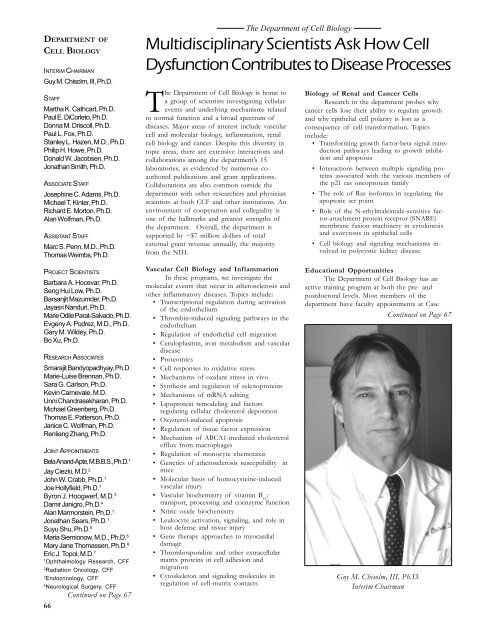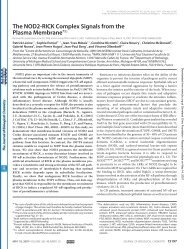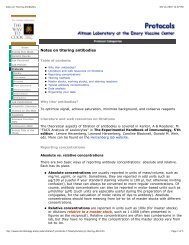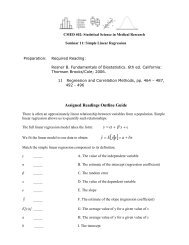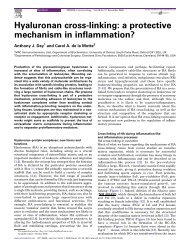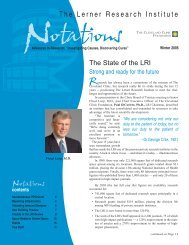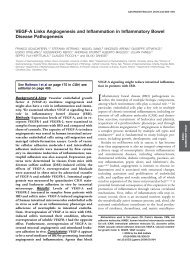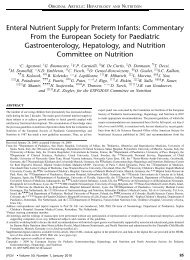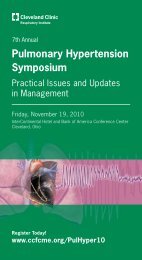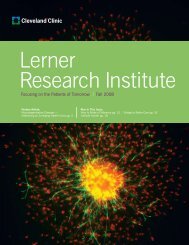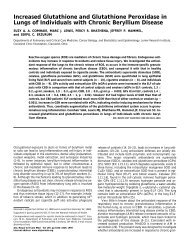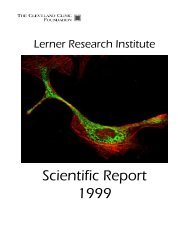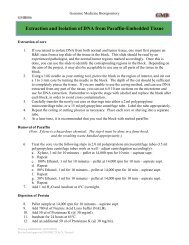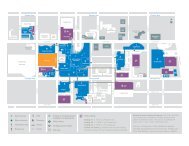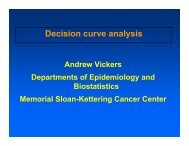Scientific Report 2003-2004 - Cleveland Clinic Lerner Research ...
Scientific Report 2003-2004 - Cleveland Clinic Lerner Research ...
Scientific Report 2003-2004 - Cleveland Clinic Lerner Research ...
- No tags were found...
Create successful ePaper yourself
Turn your PDF publications into a flip-book with our unique Google optimized e-Paper software.
DEPARTMENT OFCELL BIOLOGYINTERIM CHAIRMANGuy M. Chisolm, III, Ph.D.STAFFMartha K. Cathcart, Ph.D.Paul E. DiCorleto, Ph.D.Donna M. Driscoll, Ph.D.Paul L. Fox, Ph.D.Stanley L. Hazen, M.D., Ph.D.Philip H. Howe, Ph.D.Donald W. Jacobsen, Ph.D.Jonathan Smith, Ph.D.ASSOCIATE STAFFJosephine C. Adams, Ph.D.Michael T. Kinter, Ph.D.Richard E. Morton, Ph.D.Alan Wolfman, Ph.D.ASSISTANT STAFFMarc S. Penn, M.D., Ph.D.Thomas Weimbs, Ph.D.The Department of Cell Biology is home toa group of scientists investigating cellularevents and underlying mechanisms relatedto normal function and a broad spectrum ofdiseases. Major areas of interest include vascularcell and molecular biology, inflammation, renalcell biology and cancer. Despite this diversity intopic areas, there are extensive interactions andcollaborations among the department’s 15laboratories, as evidenced by numerous coauthoredpublications and grant applications.Collaborations are also common outside thedepartment with other researchers and physicianscientists at both CCF and other institutions. Anenvironment of cooperation and collegiality isone of the hallmarks and greatest strengths ofthe department. Overall, the department issupported by ~$7 million dollars of totalexternal grant revenue annually, the majorityfrom the NIH.The Department of Cell BiologyMultidisciplinary Scientists Ask How CellDysfunction Contributes to Disease ProcessesBiology of Renal and Cancer Cells<strong>Research</strong> in the department probes whycancer cells lose their ability to regulate growthand why epithelial cell polarity is lost as aconsequence of cell transformation. Topicsinclude:• Transforming growth factor-beta signal transductionpathways leading to growth inhibitionand apoptosis• Interactions between multiple signaling proteinsassociated with the various members ofthe p21 ras oncoprotein family• The role of Ras isoforms in regulating theapoptotic set point• Role of the N-ethylmaleimide-sensitive factor-attachmentprotein receptor (SNARE)membrane fusion machinery in cytokinesisand exocytosis in epithelial cells• Cell biology and signaling mechanisms involvedin polycystic kidney diseasePROJECT SCIENTISTSBarbara A. Hocevar, Ph.D.Seng Hui Low, Ph.D.Barsanjit Mazumder, Ph.D.Jayasri Nanduri, Ph.D.Marie Odile Parat-Salvado, Ph.D.Evgeny A. Podrez, M.D., Ph.D.Gary M. Wildey, Ph.D.Bo Xu, Ph.D.RESEARCH ASSOCIATESSmarajit Bandyopadhyay, Ph.D.Marie-Luise Brennan, Ph.D.Sara G. Carlson, Ph.D.Kevin Carnevale, M.D.Unni Chandrasekharan, Ph.D.Michael Greenberg, Ph.D.Thomas E. Patterson, Ph.D.Janice C. Wolfman, Ph.D.Renliang Zhang, Ph.D.JOINT APPOINTMENTSBela Anand-Apte, M.B.B.S., Ph.D. 1Jay Ciezki, M.D. 2John W. Crabb, Ph.D. 1Joe Hollyfield, Ph.D. 1Byron J. Hoogwerf, M.D. 3Damir Janigro, Ph.D. 4Alan Marmorstein, Ph.D. 1Jonathan Sears, Ph.D. 1Suyu Shu, Ph.D. 5Maria Siemionow, M.D., Ph.D. 6Mary Jane Thomassen, Ph.D. 8Eric J. Topol, M.D. 71Ophthalmology <strong>Research</strong>, CFF2Radiation Oncology, CFF3Endocrinology, CFF4Neurological Surgery, CFFContinued on Page 6766Vascular Cell Biology and InflammationIn these programs, we investigate themolecular events that occur in atherosclerosis andother inflammatory diseases. Topics include:• Transcriptional regulation during activationof the endothelium• Thrombin-induced signaling pathways in theendothelium• Regulation of endothelial cell migration• Ceruloplasmin, iron metabolism and vasculardisease• Proteomics• Cell responses to oxidative stress• Mechanisms of oxidant stress in vivo• Synthesis and regulation of selenoproteins• Mechanisms of mRNA editing• Lipoprotein remodeling and factorsregulating cellular cholesterol deposition• Oxysterol-induced apoptosis• Regulation of tissue factor expression• Mechanism of ABCA1-mediated cholesterolefflux from macrophages• Regulation of monocyte chemotaxis• Genetics of atherosclerosis susceptibility inmice• Molecular basis of homocysteine-inducedvascular injury• Vascular biochemistry of vitamin B 12:transport, processing and coenzyme function• Nitric oxide biochemistry• Leukocyte activation, signaling, and role inhost defense and tissue injury• Gene therapy approaches to myocardialdamage• Thrombospondins and other extracellularmatrix proteins in cell adhesion andmigration• Cytoskeleton and signaling molecules inregulation of cell-matrix contactsEducational OpportunitiesThe Department of Cell Biology has anactive training program at both the pre- andpostdoctoral levels. Most members of thedepartment have faculty appointments at CaseContinued on Page 67Guy M. Chisolm, III, Ph.D.Interim Chairman


